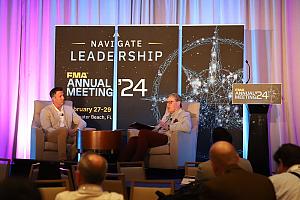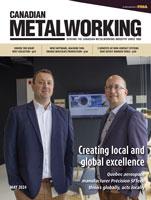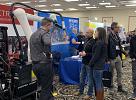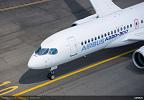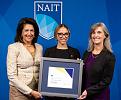- FMA
- The Fabricator
- FABTECH
- Canadian Metalworking
"Two-tenths" all day long
Aero Safe, in Fort Erie, Ontario, does high-precision machining for the aerospace industry.
- By Jim Anderton
- November 1, 2013
- Article
- Metalworking
There’s an old adage that says that it’s not what you have, it’s what you do with what you have that matters.
A case in point is Fort Erie, Ontario-based Aero Safe Technologies, where careful application of appropriate technology, a strong workforce and a simple, robust management system combine to make a business that thrives in the highly competitive aerospace and high-precision sector.
Operations Manager Geoff Haynes tells the story: "We started as a job shop that created their own product used in the deployment of cargo parachutes. That product did take off for a while, but it wasn’t as big as we needed, so we went into subcontract machining.
"That’s where we’ve been ever since, doing high precision, high complexity parts for aerospace, satellite communications, military and defense as well as medical applications. We diversify as much as we can."
The founder of Aero Safe, Tony Rodway, with son Nicholas, started the business as a small operation with just a few employees and they now have a 30,000 square foot, temperature controlled facility with 50 employees and 32 CNC machines.
Aero Safe’s equipment is primarily sourced from Matsuura and Nakamura Tome, and includes two recently installed five-axis Matsuura machines. Capabilities include nine-axis mill-turning with live tooling, wire and sinker EDM, precision deburring and CMM inspection using Zeiss equipment.
"We’re enjoying a busy time right now because of the high-tech industry", says Haynes, adding, "we’re upgrading equipment as much as we can with two new five axis machines (Matsuura MX-520’s) and we also probe in-process, working to two-tenths of a 'thou' all day long.
"General Manager, Nick Rodway is extremely proud of the work his father began with the co-op programs with the local high schools and continues to work with the schools to keep this program running successfully. Tony Rodway was presented with the Yves Landry Award for his work with the co-op program at Fort Erie High School. Our labour force is mostly local people that have come up from local high schools and apprenticeship programs started here."
Aero Safe has a long list of famous-name clients, but the nature of their work makes much of it confidential. Parts for the Joint Strike Fighter, and numerous military aircraft and helicopter applications are machined on site, as are very high precision satellite communications equipment.
Aerospace components aren’t just high precision; they frequently need special finishing processes too. A JSF component in 6061 aluminum, for example, requires an anodized finish with some surfaces chemically conversion coated for grounding purposes. The coated faces are left proud and are then machined back after the entire part is anodized. The part is then sent for the secondary coating step. The chemical conversion process doesn’t adhere to the anodized surfaces, leaving the finished part in “spec”. The complex part was quite a win for Aero Safe, says Haynes.
"The part used to take 11 to 21 operations, using multiple machines. Now that we’ve bought the new 5-axis machines it’s down to four operations."
Tight customer machining specs are common at Aero Safe, but for space satellite and military applications, even deburring and cleaning goes beyond conventional machine shop practices. One customer inspects parts under 50 times magnification for surface defects.
The deburring is "done by hand, under microscopes", states Haynes, by “very patient, skilled workers. It requires steady hands. We wouldn’t be where we are without the quality we deliver. Only 4 or 5 employees are not ticketed machinists; we just can’t have unskilled workers doing this kind of work. Even with five axis machines, we’re using the limits of the machines, plus or minus two 'tenths' in repeatability and accuracy. It needs an experienced machinist."
Controlling processes that require multiple steps with expensive materials is key to success at Aero Safe. Geoff Haynes explains: "We have a slick ERP system that controls all our job cards and routers by bar codes. The 'job traveler' follows the material around the shop. It has customer information, dates and requirements and every operation on every machine it goes through is identified with a short description and bar code.
"The setter or operator would scan onto the operation with the bar code, after which the machinist is on the clock, working on that job. He might scan in in the morning, out in the evening and record the number of parts produced. We track all the various operations including deburring and inspection as well as coating and assembly steps like Helicoil insertion, right to pack-and-ship.
[gallery type="slideshow" ids="100382,100381,100380"]
"The lists can tell us history, materials required, part history, purchasing requirements… it’s a great system. It’s the E2 Shop System from Shoptech Software. Each week I get a report on how we did on every job, time spent against estimated time. This lets us adjust our job costs."
Aero Safe has four CNC programmers (all skilled machinists) on staff and does a lot of solid modelling, either with customer supplied drawings or from a CAD model. Aero Safe uses both GibbsCAM and Edgecam.
From there the models are exported to a CAM system for code generation. To get code out to the machines, Aero Safe uses floating laptop computers that pull programs from the CAD/CAM system through a wireless network. The laptops are them plugged into the machine controls, a simple, secure system.
Finding skilled help is as much of an issue at Aero Safe as everywhere else, but the firm has taken steps to address the problem directly.
"We have an internal training program where we take young kids from the local high school", says Haynes.
"It starts with a co-op program where they’re here during their final year work-ing a couple of days a week for half a day. There they learn if they want to get into the skilled trades. We’ll choose one or two of the top students and offer them a summer job. If they work out well in the summer, we’ll offer them an apprenticeship for the following year. The apprenticeship involves three to four years of training including night classes through Niagara College in St. Catherines. After that we have a skilled machinist."
While many shops that train suffer high attrition rates post qualification, Haynes says Aero Safe has a simple technique for good retention: “We treat them well and they work hard….we like to think of it as a job for life for great people.”
About the Author
subscribe now


Keep up to date with the latest news, events, and technology for all things metal from our pair of monthly magazines written specifically for Canadian manufacturers!
Start Your Free Subscription- Industry Events
MME Saskatoon
- May 28, 2024
- Saskatoon, SK Canada
CME's Health & Safety Symposium for Manufacturers
- May 29, 2024
- Mississauga, ON Canada
DiPaolo Machine Tools Open House 2024
- June 4 - 5, 2024
- Mississauga, ON Canada
FABTECH Canada
- June 11 - 13, 2024
- Toronto, ON Canada
Zoller Open House & Technology Days 2024
- June 12 - 13, 2024
- Ann Arbor, MI











